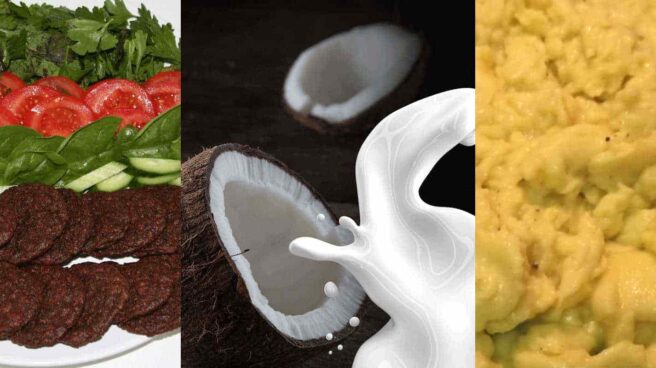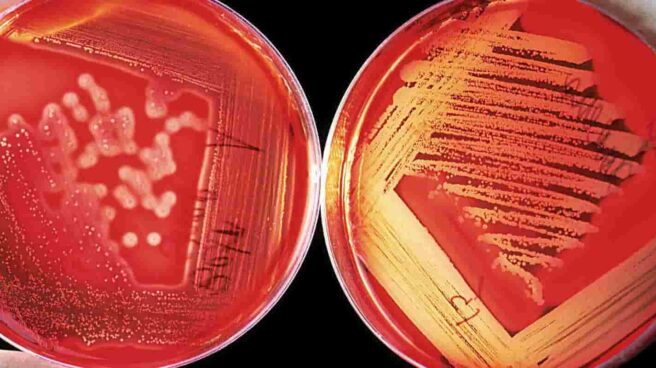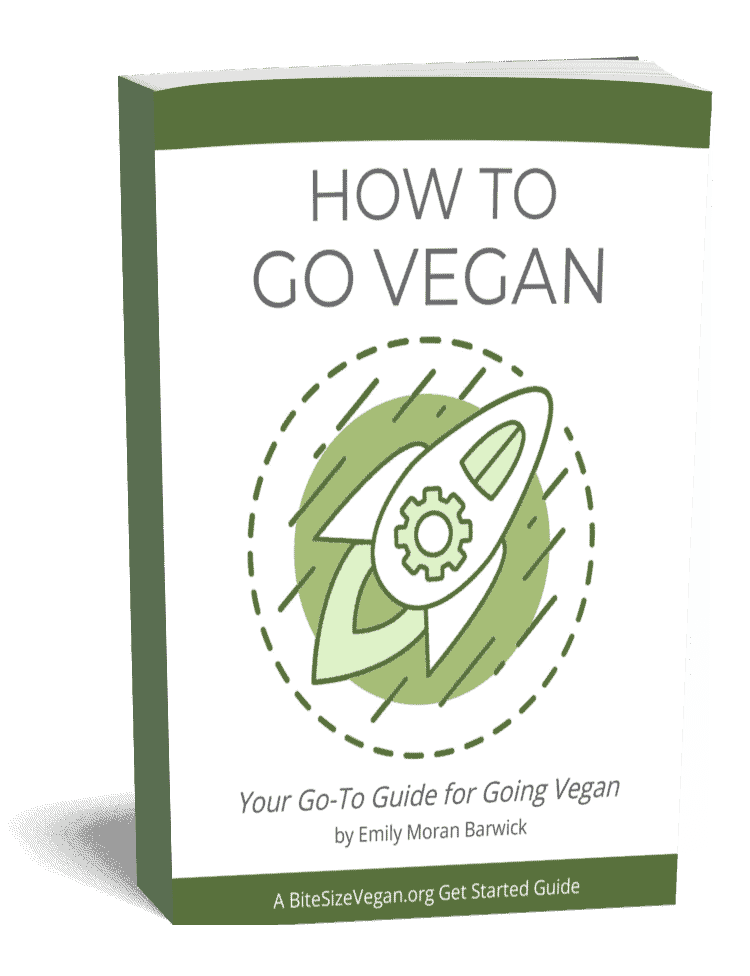Could “test tube burgers” spell the end of animal exploitation? A solution to our environmental crisis? Find out why this is such a hot-button issue within the vegan community as we look at the pros and cons of lab grown meat.
Veganism is all about reducing the harm we cause to sentient beings to the best of our ability. This is why we don’t eat animal products—it’s impossible to take the body part or secretion of a living being without exploitation and pain.
Or is it? If meat and other animal products could be made without harming animals, would there finally be such a thing as vegan meat? [tweet this]
When it comes to lab grown meat, there are vegans on both sides of the debate. With the potential for massive reductions in the environmental impact of animal agriculture and an end to the suffering and death of trillions of animals every year, why wouldn’t every vegan be championing the cause for test tube meat?
As with most topics I set out to cover, cultured meat production is far more complicated than it may first appear. We’re going to cover some of the pros and cons of cellular agriculture and why it’s a hot button within the vegan community.
As always, I’ll be barely scratching the surface, so you can dig into the citations and resources at the base of this post for more information.
A Brief History of Cultured Meat
The concept of growing and maintaining muscle outside of the body is not new. Starting in 1912, biologist Alexis Carrel kept cells from an embryonic chicken heart beating in a nutrient bath in his laboratory for more than 20 years.[1] In 1931, Winston Churchill wrote in a predictive essay optimistically entitled Fifty Years Hence that, “We shall escape the absurdity of growing a whole chicken in order to eat the breast or wing, by growing these parts separately under a suitable medium.”[2]
Over the decades from NASA-backed fish fillets made of goldfish cells[3][4] to the 2013 taste test of the first lab-grown burger,[5][6] the cultured meat, well, culture, continues to grow. [See [7] for a brief but thorough timeline in the “In-Vitro Meat” section of the essay].
The (Potential) Pros of Lab Grown Meat
The advantages of this method of meat creation are obvious. Despite the efforts, hopes and dreams of vegans and activists alike, the global demand for meat is on the rise with India and China leading the charge.[8][9]
The Environmental Impact of Lab Grown Meat
With animal agriculture contributing as much as 51% of global greenhouse gas emissions,[10] using a third of the earth’s fresh water,[11][12][13][14] up to 45 percent of the Earth’s land,[15][16] causing 91 percent of Amazon rainforest destruction[17][18] and serving as a leading cause of species extinction, ocean dead zones, and habitat destruction,[19][20][21][22][23][24][25][26][27][28][29] the environmental implications alone could be staggering. [tweet this]
A 2011 study concluded that, “cultured meat involves approximately 7–45% lower energy use … 78–96% lower GHG emissions, 99% lower land use, and 82–96% lower water use depending on the product compared.”[30] While these numbers sound promising, the study was largely criticized for basing its numbers on a not-yet-proven method of cultured meat growth.
While still theoretical, a 2014 study accounting for other potential production methods found that energy use for cultured meat actually exceeded current levels for beef production, but had significantly lower greenhouse gas emissions and land usage and was only higher than poultry in water usage.[31]
The reality is that the actual environmental impact of cultured meat remains unknown because it’s still in such an experimental phase. The ground meat grown for 2013’s seminal burger was a relatively simple creation of pure protein. It lacked any of the fat and blood that give meat its flavor or the firmness of once-active muscle tissue. In order to create meat products of more substance, the muscle, which is what meat is after all, has to be exercised and provided with artificial blood flow, oxygen, digestion and nutrition. [32][33][34][35] Some scientists speculate that this increased energy demand may negate any reduction in land usage and agricultural input. [36][37]
Basically, when it comes to the environmental benefits, it’s still too early to know.
The Ethics of Lab Grown Meat
So what about the other main benefit: an end to the suffering and death of trillions of beings every year? [tweet this]
Here is where cultured meat has the potential to shine.
Maybe. Eventually.
There are several significant hurdles to overcome before lab-grown meat can be called anything near “cruelty and animal-free.” The major issues on the ethics end are establishing self-renewing stem cells and finding plant-based materials for the growth medium and scaffolding.
Will Lab Grown Meat Save Animals?
To understand what that means, I’ll give a very simplified version of in-vitro meat production. Initially, cells are taken via biopsy from a living animal and deposited into a growth medium where they proliferate and grow. Eventually, in order to produce meat products with more structure than the ground patty, they will need a form of scaffolding to hold their shape.
The first ethical issues arise when considering the long-term viability of the initial harvested cells. Professor Mark Post, the man behind the famous taste-tested burger, has said that, “the most efficient way of taking the process forward would still involve slaughter,” with a “limited herd of donor animals” kept for stock.[38] Others in the movement envision the establishment of a self-renewing stem cell line, meaning only an initial biopsy would be required at which point the cell line would replicate indefinitely.[39][40][41]
Yet another concern is that—given humanity’s love of the new, different and exotic—we may start breeding specialty animals for cell harvesting, which would still require the confinement and reproductive control of sentient beings.[42]
As a side-note, Post’s famous burger was made with egg powder to enhance the taste, introducing another level of animal suffering.[43] This is by no means, however, a necessary practice.
The Troubling Issue of Fetal Serum
The second major ethical issue and one that isn’t widely addressed in most of the news reports on cultured meat, is the growth medium into which the cells are deposited. At the moment, the most widely used medium is bovine fetal serum. Fetal serum from an array of animals is commonly employed in a wide range of experiments, including those for tampons, which I covered in my “Are Tampons Vegan?” video.
The harvesting of bovine fetal serum is far from transparent. One study reached out to 388 harvesting entities with only 4% responding with any kind of methodology data. Five sources explicitly declared their harvesting methods to be confidential.[44]
Of those that did respond, the typical procedure for fetal serum harvesting was “by cardiac puncture” meaning a needle directly into the beating heart of the fetal cow. They specify that, “Fetuses should be at least 3 months old; otherwise the heart is too small for puncture.” The general process is as follows:
“At the time of slaughter, the cow is found to be pregnant during evisceration (removal of the internal organs in the thorax and abdomen during processing of the slaughtered cow) … The calf is removed quickly from the uterus [and] a cardiac puncture is performed by inserting a needle between the ribs directly into the heart of the unanaesthesised fetus and blood is extracted.” This bleeding process can take up to 35 minutes to complete while the calf remains alive. Afterwards, “the fetus is processed for animal feed and extraction of specific substances like fats and proteins, among other things.”[45]
The study continued with a detailed debate as to whether the fetal cows can feel this procedure and their possible slow death from anoxia, meaning lack of oxygen, from placental separation, and estimated that between 1 and 2 million fetuses are harvested annually for serum.[46]
All in all, fetal serum from any animal is not, by any stretch of the imagination, cruelty-free. The good news is that the champions of the cultured meat movement seem to be invested in finding plant-based medium alternatives with both algae and mushrooms providing promising options.[47][48][49][50][51] Fetal serum’s drawbacks don’t stop at the ethical line. There are scientific concerns as batches vary considerably in their composition. It also poses the threat of pathogen introduction, is not environmentally friendly and is cost-prohibitive. Dr. Neil Stephens of Cardiff University states that: “everyone in the field acknowledges this as a problem … It currently undermines a lot of the arguments that people put forward in support of in vitro meat.”[52]
The Health Benefits of Lab Grown Meat
This leads into two of the additional pros of cultured meat, both revolving around human health. Though I personally believe that health is the last worry when it comes to producing a possible alternative to mass animal slaughter, it’s worth noting that the composition of cultured meat can be altered to provide superior nutritional benefits. The level of fat and type of fat can be selectively controlled. The threat of food contamination and spread of pathogens would also be greatly reduced, as cultured meat would not involve all the biohazards of traditional slaughter.[53][54][55]
The (Potential) Cons of Lab Grown Meat
So if scientists are able to create a self-replicating cell line, thus eliminating the enslavement and potential slaughter of animals, and find a suitable plant-based growth-medium and scaffolding, thus eliminating the cruelty of fetal serum and other animal byproducts, what objections remain against going after this concept in full force? Two of the largest are cost and what’s best described as “the ick factor.”
The “Ick Factor”
Surveys involving every range of dietary practice seem to indicate that the majority of people are put off by the concept of lab-grown meat.[56][57][58][59][60] Interestingly enough, those people with the highest rates of meat consumption appear to be the most sensitive to disgust.[61]
Of course cultured meat proponents emphasize that “lab-grown” is a bit of a misnomer. While in the testing stages, the meat is grown in laboratories. However, were it to go to commercial production, it would be made in factories just like all of our packaged food items, and—some could argue—would be more natural than other chemical concoctions the public readily consumes. [see[62] for an illustration of potential production methods].
Also, given what all we inject into our food animals from hormones to antibiotics, to our outright manipulation of their genes, one could ask just how natural “standard” animal products really are.
While cultured meat doesn’t require the use of GMO’s, it’s possible that genetically modifying cells may allow them to reproduce faster and thus prove more economical.[63]
The Cost of Lab Grown Meat
Speaking of cost, Mark Post’s initial burger in 2013 cost approximately £250,000 (over $350,000) to produce.[64] However, by 2015, Post stated that the cost is now down to £8.00.[65][66]
As with any new technology, the initial cost investments will be steep, but Post and others in the movement see cultured meat eventually attaining a competitive price to traditional products, though most likely not for at least another decade.[67]
The Debate Continues
The vegan community is most dramatically torn on either side of this issue. (See [68] for examples.) Some feel that any product derived from an animal remains a form of exploitation. Others believe that with the insurmountable fight against the ongoing animal holocaust and more non-vegans being born every day, we need to search for practical and viable solutions to replace humanity’s rising demand for meat.[69]
The vegans on the pro-cultured meat side I’ve come across through my research say they place the animals’ interests above all else. They believe it’s unrealistic to expect humanity on a global scale to cease or even reduce their consumption of animals. Thus, providing an alternative that not only looks and tastes like but actually is meat could be, with the proper harvesting method and growth medium, the most immediate path to animal liberation currently available.
With the concurrent rise of research into milk and egg-producing yeast and leather and other animal byproducts,[70] could it be that the laboratory and not the picket line will be the ultimate genesis of a vegan world? [tweet this]
I’d love to hear your thoughts on this hot debate in the comments below.
— Emily Moran Barwick







Wow. This is great information. I heard of this but this video explains it clearly.
I would not want to even try it. I still don’t understand why any animal products are even needed. There are plenty of plant based food.
Thank you so much Sally Anne. So glad you enjoyed it!
Great video, Emily. I can see both sides to the question, but personally I wouldn’t want it. My fear is that if it became mainstream it would keep people hooked on the taste of meat, and sooner or later society would go full circle to wanting “real” meat from slaughtered animals again ! But maybe that’s so far in the future that it’s a non-
issue. :)
My wish for lab grown meat is for my cats and all the other cats out there and animals that are truly obligate carnivores. I have been vegan for 9 years but my kitties just ain’t feelin the vegan kitty food we have tried. There is maybe one more brand left for us to try. And what about all the rescued big cats? Like Big Cat Rescue, they have a huge demand for animal flesh, I have never heard anyone address this issue other than side stepping it saying well we shouldn’t have these animals in captivity in the first place. Well guess what, we do! All the vegan youtubers I see have dogs which seem to easily adapt to veg diets and I know some people have success with cats eating veg but it almost seems cruel to the cat to deny them the food they were born to eat. I am conflicted and I have had sick cats in the past so all I want is to give them a healthy life and I want to maintian my “ethical vegan” status. Any thoughts or advice?
Milk yeast and egg yeast equals omlette yeast?
I know about Bramble the Collie but seeing a dog eat meat for the first time in years after living on kibbles means I have no qualms about pets eating meat. If you don’t like it, don’t get a pet. Wild animals have to survive and they don’t have a vegan alternative menu!
Oops! Forgot to say, Good video! Thanks for all the hard work.
Even if meat is able to be grown in a laboratory, what about the research that Dr. Campbell has done showing that animal protein causes cancer cells to grow? Would people still be eating an unhealthy diet even if more animals were spared? I agree with Sally Anne when she says there are still plenty of (delicious) plant-based foods.
As I say in this video and post, cultured meat has the potential to alter the nutritional makeup of the products, *potentially* making them fit for human consumption and *potentially* beneficial. But I think health is one of the less immediate issues that lab-grown meat is attempting to address.
What is this about tampons?? There not vegan???
Nope. Not the vast majority. See this post.
If cultured meat is “vegan” and somehow distinct for that of a living animal, how would it be to eat meat culture from human stem cells? Cannibalism?
Waw, Emily, you twist the veganism definition so it fits the lab idea. But you can not twist the ideology : veganism rejects the commodity status of other animals. I quote you :”Veganism is all about reducing the harm we cause to sentient beings to the best of our ability. This is why we don’t eat animal products. It’s impossible to take the body part or secretion of a living being without exploitation and pain.”
So you think that if it was possible to “take” (you mean steal) a bit, painlessly, from them it will make it ok?? Who said that we should “take the body part or secretion of a living being” in ifrst place ? We have enough t eat, and if we eat only plants we will end the world hunger in no time- humanity’s old dream.
I mentain that veganism is about ethics and ending the specieism which is the cause of all this misery in first place. It’s Wrong to exploit animals and there is no respect involved i lab meat culture- just think about the gesture: some worker in white approaches an animal in order to steal a portion of the body (probably from an unborn phoetus). It is also unhealthy , even if it’s 100% clean from patogens- as it contains non-essential amino-acids fro a different species(!) , something which we already produce. What we need from food is just the essential amino-acids, in order to build the protein molecule (inside our body, after ingestion)- that’s how we produce the protein- a detail very few vegans think about – they just buy the “whole protein ” , as it is sold- but protein is not a nutrient – it’s a molecule we have to form by ourself, after we ingest. So, non-essential amino-acids from a different species does Never fit into the chemical structure of our protein we form all the time… This is why it will always be unhealthy for us to eat animals , from a micro cellular point of view, no matter how clean for pahogens the “meat” would be.
There are no short cuts in veganism. I would say, both you , Gary Yourosky ad who might be in this, calm down and continue the good work but do some political work as well. We can not just look at things from an animal activst point of view- we must make politicians to shift from animal agriculture to plant agriculture (remember how unsustainable this all is? It drains the water ressources and polutes heavily everywhere. If we don’t get politicians to make some reforms asap, we will not be able to ward the climate change, so let’s continue to do our informative work, but please , reflect more at the beginning of the Meat machine – the breeding part , not only at the confinement , torture and kill- it is very Wrong to manipulate with the genitals of animals, it is Wrong to reproduce other species than us …Clearly.
Dana, thank you so much for your very thoughtful comment. I actually didn’t come down on either side of the cultured meat debate in this video, but rather laid out the pros and cons and the formidable hurdles of such a concept. Interestingly enough, I’ve had people post this video a LOT to “prove” that lab meat is NOT vegan and can never be, AND people posting it to “prove” that it IS and can be. It’s rather interesting.
I believe your concerns and very valid. And I have addressed the sexual manipulation and exploitation of beings in many of my videos (though plan on having a dedicated one as well). I explore it more in depth in my most recent speech as well as pertaining to the systematic sexual abuse of mothers.
Anyway, I wanted to reply quickly and thank you SO much for this feedback and your thoughtful comment. I very much appreciate you taking the time to write this out. And I ALWAYS welcome criticism and debate. I have no illusions of always being right. I most certainly make mistakes and feedback is so helpful for me to know what is working and what is not and adapt my delivery if needed.
Many thanks
Thank you for your nice response. It took though a long time :-) It is my opinion that seing animals as a purpose for lab culture will not leed to their freedom of being seen as an object and a subject of some human purpose. It can easy get out of control and can not be implemented all over the world as an honest solution to slaughter, it is simply not feasible. You guys have looked too much at the end of meat machine- you should look at the beginning – bringing animals into existence for humans use- is actually the root of the problem. Slaughtering is the implicit result of eploitation :-( Slaughtering is “just” a part of the exploiting mechanism. Clearly it’s the one which make humans most uncomfortable and it’s kept away for this reason but breeding and the whole exploit idea is wrong from the start. The industrialisation has accelerated and intesified an unnatural act, a dogma which we must unlearn now pretty fast, all over the world. Lab culture is something which just switch the focus and waste our time – and the aim is still the same – getting something from animals, something that does not belong to us and something that has been proven to be unhealthy to humans to eat, beyond any doubt (and as I previousely described, even 100 % clean for pathogens) . I believe that it is achievable and realistic to put all the force(as vegans) into switching to plant agriculture in the world- which means political involvement as well (due to the unsustainability and waste, pollution involved and global warming) – This is a global problem and many animal eaters are concerned about it as well,so where do we put our focus these days? In lab meat business ready on 10 years (which btw it’s unhealthy) ? In 10 years we will have other top priorities , believe me – climate change. Shifting to plant agriculture is the missing key in fighting the climate change.
There are many who “support “the lab meat idea because Gary Y has convinced them that it will end the slaughter, bc he and others think that it is “unrealistic” to veganise the entire world. Well, to become vegan it means that one must understand deaper values and not everbody gets vegan over the night or for the animals, indeed- but eating plants for a , let’s say 30 days, for a longer period of time will lead to veganism, so it is important that political reforms which aim at shifting to plant agriculture will appear and be implemented soon .
Therefore it is important that vegans get involved in politics too (not as Gary says), so we get them to make reforms asap towards plant agriculture (with climate change, pollution and unsustainability as catalizators). Some animal activists does not believe in political changes, however if we don’t make politcal changes as I mentioned, we can kiss our a. good bye. So we must simply have to do these changes. This means that we have to expose the meatdairy industry and the pollution , the water depleation and all the things related, as a disaster that it is.
The whole point with veganism is not how we treat animals (you said something like if we do not harm them then it is ok to take from their body) but that we treat them at all. It is very obvious that going lab meat is in contradiction with the veganism idea- that has been made clear for decades ago by others. Just that the technology might permit the cell replication does not mean it is right. We must end humans’ consumption and exploitation of animals now- that’s the only way to fight the climate crisis – and that’s a serious threat and work.
I end for now with a quote from your post.
“Or is it? If meat and other animal products could be made without harming animals, would there finally be such a thing as vegan meat?” The answer to it is No, for the reasons described (it is an oxymoron).
Thank you for your time.
The acid test for one’s belief that lab meat is vegan-friendly and non-exploitative of animals is this:
There is no reason why human cells could not be replicated just as easily as bovine.
If you don’t vehemently support this “consensual” alternative, can you claim to be against animal exploitation?
Could it be that vegan supporters of lab meat do so for the same reasons that we’ve always exploited animals – because we can?
I’m am more annoyed at the fact that all this time later after initially commenting on this, NO ONE has addressed my topic on lab grown meat. Probably because it doesn’t fit neatly into the vegan dogma, and I am a vegan now for 9 years BTW. I don’t want to hear how your pet dog thrives eating plant based, duh. What about the animals we have domesticated that are carnivores, like cats? Everyone on the internet has an antidote about how well so and so’s kitty did eating vegan but it is rare these cats do well. What about people who run big cat sanctuaries? These animals can’t be returned to the wild unfortunately, and they also must be fed. What about rescue organizations? Find a starving baby seal on the beach, well the vegans say feed him corn cause you can’t kill a fish to feed that baby seal, best let him die. Feed them lab grown meat or kill more animals for them to eat? What to do, you idealist group of vegans?
People don’t need meat, lab grown or otherwise. I don’t know why anyone is till even talking about it. But no one has commented on my initial comment, feeding lab grown meat to the carnivores out there who DO need it.
I guess it all comes down to the ability to choose. Humans have the ability to choose whether they eat meat or not. Carnivores live off of instinct and don’t have that same conscious choice on if they eat other animals or not. I think it’s borderline animal cruelty to refuse a cat, big cat, seal, what have you, the food that they require to be healthy and thrive.